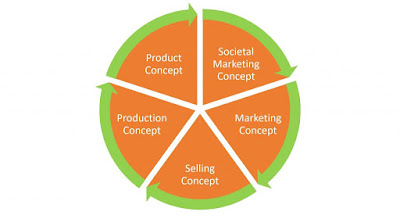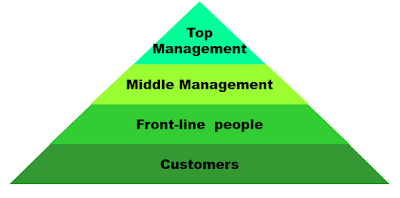Marketing Management Concepts by Philip Kotler & Keller
Marketing Management Concepts
- The Production Concept
- The Product Concept
- The Selling Concept
- The Marketing Concept
- The Societal Marketing Concept
Production Concept
- Consumers will favor those products that are widely available and low in cost.
- Managers concentrate on achieving high production efficiency and wide distribution.
- The assumption is valid at least in 2 situations:
- The demand for a product exceeds the supply (suppliers will concentrate on finding ways to increase production)
- The product’s cost is high and has to be decreased to expand the market.
Product Concept
- Consumers will favor those products that offer the most quality, performance, or innovative features.
- Managers in product-oriented organizations concentrate on making superior products and improving them over time.
- The assumption ğ the customers will admire well-made products and can evaluate product quality and performance
- This concept may lead to marketing myopia
Selling Concept
- Aggressive selling and promotion
- Assumptions are;
- Consumers must be convinced of buying company products
- The company is powerful in generating effective selling and promotion to stimulate more buying
- This concept is mostly used by firms that have overcapacity.
- The aim is “to sell what they make” rather than “make what the market wants.”
- Short-term profits are more important (customer dissatisfaction may occur)
Marketing Concept
The key to achieving organizational goals consists of being more effective than competitors in creating, delivering, and communicating customer value to target markets.4 pillars of modern marketing :
- Target market
- Customer needs
- Integrated marketing
- Profitability through customer satisfaction
Marketing and Sales Concepts Contrasted:
|
Selling |
Marketing |
|
§
Selling starts with the seller and is
preoccupied all the time with the needs of the seller.
§
Seller is the center of the business
universe; activities start with the sellers’ existing products. § Emphasizes on saleable surplus available within the corporation. § Seeks to quickly convert ‘products’
into ‘cash’. § Views business as a ‘goods-producing
process’. § Sellers’ preference dominates the formulation of the ‘marketing mix’. § The firm makes the product first and then figures out how to sell it and make a profit. § Emphasis on staying with the existing technology and reducing costs § Sellers’ motives dominate marketing communications. § Cost determines the price. § Different departments of the business
operate as separate watertight compartments. |
§
Marketing starts with the buyer and
focuses constantly on the needs of the buyer. §
The buyer is the center of the
business universe; activities follow the buyer and his needs. §
Emphasizes the identification of a
market opportunity. §
Seeks to convert customer ‘needs’
into ‘products’. §
Views business as a ‘customer
satisfying process’. §
The buyer determines the shape the
‘marketing mix’ should take. §
What is do offered as a product is
determined by the customer. The
firm makes a ‘total product offering’ that will match and satisfy the
identified needs of the customer. The
‘product’ is the consequence of the marketing effort; the marketing effort leads to products that the customers want to buy in their interest. §
Emphasis on innovation in every
sphere; on providing better value to the customer by adopting better
technology. §
Marketing communications are looked
upon as the tool for communicating the benefits/satisfactions provided by the
product. §
The consumer determines price; price
determines costs. §
All departments of the business
operate in a highly integrated manner, the sole purpose being the generation of consumer satisfaction. |
2) Customer needs
- Consumers may not be fully conscious of their needs
- It may not be easy to articulate these needs
- They may use words that require some interpretation
- Customer-oriented thinking to define customer needs from the customer’s point of view
- Sales revenue ğ New customers + Repeat customers
- “Customer Retention” vs. “Customer Attraction”
- Customer satisfaction is a function of the product perceived performance and buyer’s expectations
3) Integrated Marketing
i) Various marketing functions must work together for customer satisfaction (coordination of 4Ps; marketing mix elements)
Marketing Mix: controllable variables the company puts together to satisfy its target market(s).
- Product: Product variety, quality, design, features, brand name, packaging, sizes, services, warranties, returns
- Price: List price, discounts, allowances, payment period, credit terms
- Promotion: Sales promotion, advertising, sales force, public relations, direct marketing
- Place: Channels, coverage, assortments, locations, inventory, transport
Marketing Concept - The 4P's/ The 4C's
Modern Marketing Concept -
Approaches to the study of marketing:
1. Traditional Approach: This is the classical concept of marketing. According to this concept, marketing is a part of the production process. This concept is based on the assumption that the manufacturer must produce the goods and distributes them to the consumers.
Traditional Organisation Chart
Characteristics of the Traditional
Approach:
The main characteristics of this concept
of marketing are as follows:
1)
It stresses upon production.
2) It assumes that marketing is only the
physical distribution of goods and services from producer to consumer.
3) It assumes that marketing starts after
the goods have been produced and it ends after the goods have been sold.
4)
It does not provide for any allied the activity of marketing such as transportation, warehousing, insurance,
financing, etc.
5) According to this concept, the ultimate object of marketing is to maximize profits by maximizing sales.
2. Modern Approach: Modern The concept of marketing is customer-oriented. This concept is base on the assumption that business and industrial enterprises can achieve the object of maximizing profits only when it considers the needs and wants of its consumers and it tries the satisfaction of these needs and wants.
Modern/Customer Oriented Marketing Chart
Characteristics of Modern Approach:
Important characteristics of this concept are as follows:
i)
According to this concept, the consumer is
the key to the market, and his needs and wants are the goals of the business
activities.
ii)
Marketing is the entire process of
understanding and satisfying the needs and wants of consumers.
iii) Under this concept, first of all, the
needs and wants of consumers are discovered; then these needs and wants are
converted into goods and services; then demand is created for these goods and
services; then goods and services are physically distributed from producer to
consumer and after-sale-services are provided so that the needs of consumers
may be satisfied most effectively.
iv)
This concept assumes that the object of
earning a profit can be achieved only when the needs of society are
satisfied.
v) According to this concept, Marketing is the creation and delivery of standard of living to the society.
Societal Marketing Concept
- Company’s negative effects on society
- The conflict between consumer wants and long-term social welfare
- Marketing managers should be concerned with social responsibility
- The societal marketing concept
- The company’s task is to determine the needs and wants of target markets & to satisfy them more effectively and efficiently than competitors --in a way that preserves or enhances the consumer’s and society’s well-being.
Relationship Marketing Concept
1. Customer Relationship Management: the overall process of
building and maintaining profitable customer relationships by delivering
superior customer value and satisfaction.
- It deals with all aspects of acquiring, keeping, and growing customers
- Relationship building blocks “customer value” and “customer satisfaction”
- “Customer retention” and “customer loyalty”
- The intention ğ to gain a greater proportion of an existing customer’s purchases over a long period (increase “consumer lifetime value”!)
“Our slogan ‘5+Million More Smiling Customers’ is not about reaching sales targets but about whether we can provide greater satisfaction to a greater number of customers...
The goal is to improve customer satisfaction which translates to an increased number of ‘smiling customers’."
TakeuchiUranishi
Executive Vice President,
Toyota Motor Corporation
2. Most marketers are targeting fewer, potentially more
profitable customers.
3. Asking:
- What value does the customer bring to the organization?
- Are they worth pursuing? – customer profitability analysis
4. Focus has shifted to:
- keeping current customers, and
- building lasting relationships based on superior satisfaction and value.
- It costs 5 to 10 times as much to attract a new customer as it does keep a current customer satisfied.
Holistic Marketing Concept
The holistic marketing concept is a part of the series
on concepts of marketing and it can be defined as a marketing
strategy that considers the business as a whole and not as an entity with various parts. According to the holistic marketing concept, even if a business is
made of various departments, the departments have to come together to project a
positive & united business image in the minds of the customer. The holistic marketing concept involves interconnected marketing activities to ensure that
the customer is likely to purchase their product rather than competition.
An organization will have different departments like sales
and marketing, accounting and finance, R&D and product development, and
finally HR and operations. Thus, if you want to implement a holistic marketing
concept in your organization, you need to ensure that R&D and product
development take the feedback from marketing and sales to launch the product
which is most likely to attract customers.
On the other hand, they need to work closely with accounting
and finance to find out the exact budget for the project. Sales and marketing
need to communicate to the HR the right kind of people that they need, and
finally, admin and operations need to devise a plan to retain these people.
Holistic Market Dimensions
Some key concepts which are important in Holistic marketing
are
- Internal marketing – Marketing between all the departments in an organization
- Relationship marketing – Building a better relationship with your customers, internal as well as end customers is beneficial for holistic marketing.
- Performance marketing – Driving sales and revenue growth of an organization holistically by reducing costs and increasing sales.
- Integrated marketing – Products, services, and marketing should work hand in hand towards to growth of the organization.
Thus Holistic marketing is a concept that is organization-wide
and helps the growth of the organization with the right marketing of the
product. With the rise in competition and the limits placed on customers with
finite financial resources, decisions will be scarce and as an organization, we
have to implement holistic marketing so that decisions are made by customers in
our favor.




















Comments
Post a Comment